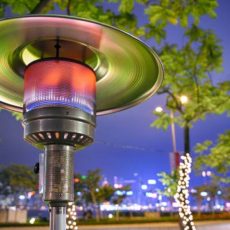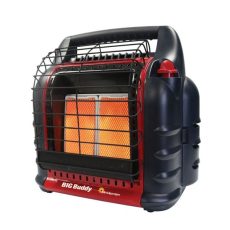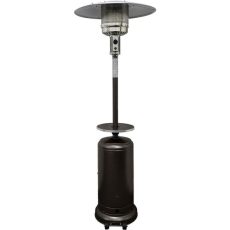Thanks to a variety of safety features, there is a need to ask “are propane patio heaters safe?” Today’s LPG patio heaters include automatic fuel shut-off mechanisms if the heater is tipped over or disrupted. Additionally, the use of a thermocouple ensures the propane is turned off if the heater’s flame is suddenly blown out by a strong gust of wind.
Safety features to look for before buying a propane heater
When shopping for your outdoor patio heater there are a few features you’ll want to insist are included to best meet your outdoor living needs in a safe and effective way.
No “naked” flames
- Look for units that don’t have “naked” flames. While open flames are decorative and often used on restaurant patios or other outdoor venues, a patio heater that contains the flames is the safest option to heat your outdoor living area.
Look for a thermocouple
- Make sure your heater includes a thermocouple to detect the presence of a flame. If the heater’s flame is extinguished, it’s critical that the flow of propane is immediately stopped. A thermocouple constantly “watches” for a flame and triggers an immediate shut off of propane if no flame is present. This safety device is critical for any outdoor patio heater and will ensure there is no chance for an external fire.
Does it have an anti-tilt device?
- Anti-tilt devices, such as a weighted base, help ensure your heater remains upright at all times. Strong winds can topple heaters without such features, and lead to an increased risk of fire or other injury. A quality patio heater requires a device that automatically shuts off the propane tank in the event of tippage.
Check for a CSA safety rating
- This is a designation that stands for Compliance, Safety, and Accountability. A CSA rating on your patio heater is a seal of approval, and gives you the peace of mind in knowing the unit has been inspected by a third-party and has met a set of rigorous safety guidelines to verify its safety for use in North America.
Propane heater placement is key
Once you’ve decided on the heater that’s right for you, it’s important to consider location and placement in your area.
- Thanks to a variety of safety features, there is no need to ask “are propane patio heaters safe?” Today’s LPG patio heaters include automatic fuel shut-off mechanisms if the heater is tipped over or disrupted. Additionally, the use of a thermocouple ensures the propane is turned off if the heater’s flame is suddenly blown out by a strong gust of wind.
- Safety features to look for before buying a propane heater
- When shopping for your outdoor patio heater there are a few features you’ll want to insist are included to best meet your outdoor living needs in a safe and effective way.
- No “naked” flames
- Look for units that don’t have “naked” flames. While open flames are decorative and often used on restaurant patios or other outdoor venues, a patio heater that contains the flames is the safest option to heat your outdoor living area.
- Look for a thermocouple
- Make sure your heater includes a thermocouple to detect the presence of a flame. If the heater’s flame is extinguished, it’s critical that the flow of propane is immediately stopped. A thermocouple constantly “watches” for a flame and triggers an immediate shut off of propane if no flame is present. This safety device is critical for any outdoor patio heater and will ensure there is no chance for an external fire.
- Does it have an anti-tilt device?
- Anti-tilt devices, such as a weighted base, help ensure your heater remains upright at all times. Strong winds can topple heaters without such features, and lead to an increased risk of fire or other injury. A quality patio heater requires a device that automatically shuts off the propane tank in the event of tippage.
- Check for a CSA safety rating
- This is a designation that stands for Compliance, Safety, and Accountability. A CSA rating on your patio heater is a seal of approval, and gives you the peace of mind in knowing the unit has been inspected by a third-party and has met a set of rigorous safety guidelines to verify its safety for use in North America.
- Propane heater placement is key
- Once you’ve decided on the heater that’s right for you, it’s important to consider location and placement in your area.
- Place your heater on a stable surface that is level and not at risk of catching fire.
- It’s best to not place the heater directly on grass.
- It should always be placed at least three feet away from any fire hazard or other combustible materials.


